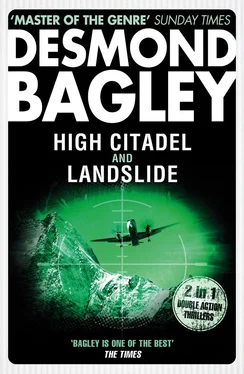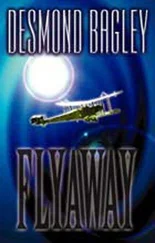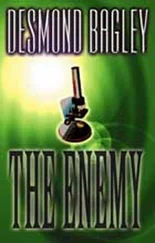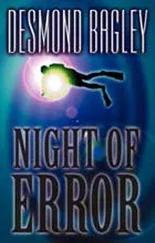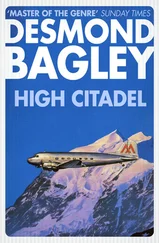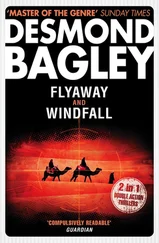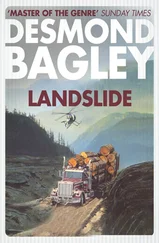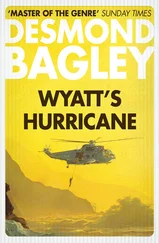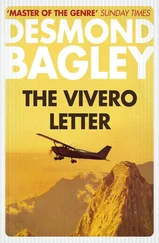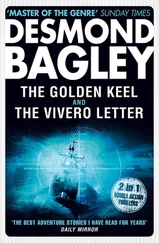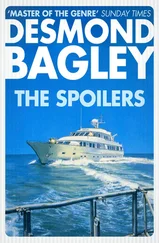‘Talking about steak reminds me that I’m hungry,’ said Willis. ‘We’ll eat before we get started.’
They opened some cans of stew and prepared a meal. As Forester took the first mouthful, he said, ‘Now tell me – what the hell is a trebuchet?’
Willis smiled and produced a stub of pencil. ‘Just an application of the lever,’ he said. ‘Imagine a thing like an out-of-balance seesaw – like this.’ Rapidly he sketched on the soft pine top of the table. ‘The pivot is here and one arm is, say, four times as long as the other. On the short arm you sling a weight, of, say, five hundred pounds, and on the other end you have your missile – a twenty-pound rock.’
He began to jot down calculations. ‘Those medieval fellows worked empirically – they didn’t have the concepts of energy that we have. We can do the whole thing precisely from scratch. Assuming your five-hundred-pound weight drops ten feet. The acceleration of gravity is such that, taking into account frictional losses at the pivot, it will take half a second to fall. That’s five thousand foot-pounds in a half-second, six hundred thousand foot-pounds to the minute, eighteen horse-power of energy applied instantaneously to a twenty-pound rock on the end of the long arm.’
‘That should make it move,’ said Forester.
‘I can tell you the speed,’ said Willis. ‘Assuming the ratio between the two arms is four to one, then the … the …’ He stopped, tapped on the table for a moment, then grinned. ‘Let’s call it the muzzle velocity, although this thing hasn’t a muzzle. The muzzle velocity will be eighty feet per second.’
‘Is there any way of altering the range?’
‘Sure,’ said Willis. ‘Heavy stones won’t go as far as light stones. You want to decrease the range, you use a heavier rock. I must tell O’Hara that – he’d better get busy collecting and grading ammunition.’
He began to sketch on the table in more detail. ‘For the pivot we have the back axle of a wrecked truck that’s back of the huts. The arms we make from the roof beams of a hut. There’ll have to be a cup of some kind to hold the missile – we’ll use a hub-cap bolted on to the end of the long arm. The whole thing will need a mounting but we’ll figure that out when we come to it.’
Forester looked at the sketch critically. ‘It’s going to be damned big and heavy. How are we going to get it down the mountain?’
Willis grinned. ‘I’ve figured that out too. The whole thing will pull apart and we’ll use the axle to carry the rest of it. We’ll wheel the damn thing down the mountain and assemble it again at the bridge.’
‘You’ve done well,’ said Forester.
‘It was Armstrong who thought it up,’ said Willis. ‘For a scholar, he has the most murderous tendencies. He knows more ways of killing people – say, have you ever heard of Greek fire?’
‘In a vague sort of way.’
‘Armstrong says it was as good as napalm, and that the ancients used to have flame-throwers mounted on the prows of their warships. We’ve done a bit of thinking along those lines and got nowhere.’ He looked broodingly at his sketch. ‘He says this thing is nothing to the siege weapons they had. They used to throw dead horses over city walls to start a plague. How heavy is a horse?’
‘Maybe horses weren’t as big in those days,’ said Forester.
‘Any horse that could carry a man in full armour was no midget,’ Willis pointed out. He spooned the last of the gravy from his plate. ‘We’d better get started – I don’t want to work all night again.’
Rohde nodded briefly and Forester looked over at Peabody, snoring on the bunk. ‘I think we’ll start with a bucket of the coldest water we can get,’ he said.
O’Hara looked across the gorge.
Tendrils of smoke still curled from the burnt-out vehicles and he caught the stench of burning rubber. He looked speculatively at the intact jeep at the bridgehead and debated whether to do something about it, but discarded the idea almost as soon as it came to him. It would be useless to destroy a single vehicle – the enemy had plenty more – and he must husband his resources for more vital targets. It was not his intention to wage a war of attrition; the enemy could beat him hands down at that game.
He had been along the edge of the gorge downstream to where the road turned away, half a mile from the bridge, and had picked out spots from which crossbowmen could keep up a harassing fire. Glumly, he thought that Armstrong was right – the enemy would not be content to be docile targets; they would certainly take steps to protect themselves against further attack. The only reason for the present success was the unexpectedness of it all, as though a rabbit had taken a weasel by the throat.
The enemy was still vigilant by the bridge. Once, when O’Hara had incautiously exposed himself, he drew a concentrated fire that was unpleasantly accurate and it was only his quick reflexes and the fact that he was in sight for so short a time that saved him from a bullet in the head. We can take no chances, he thought; no chances at all.
Now he looked at the bridge with the twelve-foot gap yawning in the middle and thought of ways of getting at it. Fire still seemed the best bet and Willis had said that there were two drums of paraffin up at the camp. He measured with his eye the hundred-yard approach to the bridge; there was a slight incline and he thought that, given a good push, a drum would roll as far as the bridge. It was worth trying.
Presently Armstrong came down to relieve him. ‘Grub’s up,’ he said.
O’Hara regarded Armstrong’s smooth cheeks. ‘I didn’t bring my shaving-kit,’ he said. ‘Apparently you did.’
‘I’ve got one of those Swiss wind-up dry shavers,’ said Armstrong. ‘You can borrow it if you like. It’s up at the shelter in my coat pocket.’
O’Hara thanked him and pointed out the enemy observation posts he had spotted. ‘I don’t think they’ll make an attempt on the bridge today,’ he said, ‘so I’m going up to the camp this afternoon. I want those drums of paraffin. But if anything happens while I’m gone and the bastards get across, then you scatter. Aguillar, Benedetta and Jenny rendezvous at the mine – not the camp – and they go up the mountain the hard way, steering clear of the road. You get up to the camp by the road as fast as you can – you’d better move fast because they’ll be right on your tail.’
Armstrong nodded. ‘I have the idea. We stall them off at the camp, giving the others time to get to the mine.’
‘That’s right,’ said O’Hara. ‘But you’re the boss in my absence and you’ll have to use your own judgment.’
He left Armstrong and went back to the shelter, where he found the professor’s coat and rummaged in the pockets. Benedetta smiled at him and said, ‘Lunch is ready.’
‘I’ll be back in a few minutes,’ he said, and went down the hill towards the pond, carrying the dry shaver.
Aguillar pulled his overcoat tighter about him and looked at O’Hara’s retreating figure with curious eyes. ‘That one is strange,’ he said. ‘He is a fighter but he is too cold – too objective. There is no hot blood in him, and that is not good for a young man.’
Benedetta bent her head and concentrated on the stew. ‘Perhaps he has suffered,’ she said.
Aguillar smiled slightly as he regarded Benedetta’s averted face. ‘You say he was a prisoner in Korea?’ he asked.
She nodded.
‘Then he must have suffered,’ agreed Aguillar. ‘Perhaps not in the body, but certainly in the spirit. Have you asked him about it?’
‘He will not talk about it.’
Aguillar wagged his head. That is also very bad. It is not good for a man to be so self-contained – to have his violence pent-up. It is like screwing down the safety-valve on a boiler – one can expect an explosion.’ He grimaced. ‘I hope I am not near when that young man explodes.’
Читать дальше
